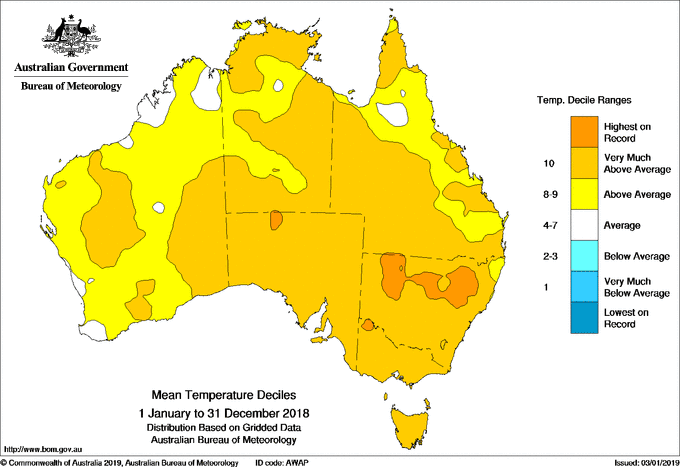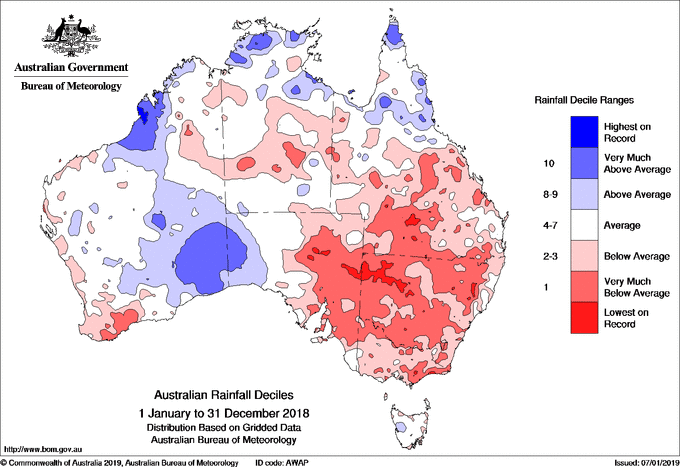News
Heat and health: 2018 was Australia’s third hottest year on record
As politicians argue over climate change policy, temperatures continue to rise – and GPs are at the forefront of treating people suffering the effects.
 Drought conditions were experienced across parts of Queensland, New South Wales, Victoria, South Australia and Tasmania in 2018. (Image: David Mariuz)
Drought conditions were experienced across parts of Queensland, New South Wales, Victoria, South Australia and Tasmania in 2018. (Image: David Mariuz)
The end of 2018 was a particularly volatile time for Australian weather.
Cyclones in Queensland, flash floods in Melbourne and giant hail stones in Sydney, followed by the year closing with many areas of Australia baking in the searing sun.
Temperatures in some parts of the country topped 49oC.
The Bureau of Meteorology (BoM) has officially declared 2018 as Australia’s third hottest year on record in this week’s climate statement.
‘Annual mean temperatures for 2018 were above average for nearly all of Australia, and very much above average for most of the mainland except parts of Western Australia, mostly in the north and west, and parts of eastern Queensland,’ the BoM stated.
‘It was amongst the six warmest years on record for all states and the Northern Territory, and the warmest on record for New South Wales.’
 Australia’s 2018 annual mean temperatures compared to historical temperature observations. (Source: Bureau of Meteorology)
Australia’s 2018 annual mean temperatures compared to historical temperature observations. (Source: Bureau of Meteorology)
All three of the country’s hottest recorded years have taken place in the new millennium. Research has shown that Australia is one of the nations most vulnerable to climate change, particularly in the developed world.
As health professionals embedded in the community, GPs are at the forefront of this issue.
‘General practice is where the rubber hits the road,’ Dr Tim Senior, a GP with a special interest in environmental issues, told newsGP last year. ‘You hear the talk of global impacts, but we’re dealing with the impacts on people in our own communities.’
Dr Janie Maxwell, GP and Chair of the RACGP Specific Interests Environmental Impacts in General Practice network, said the climate change can impact on the environment around us, and on our immediate health in many ways.
‘The cardinal signs of climate change are rising temperature and variability in precipitation, which results in increased extreme weather events, particularly heatwaves, droughts, floods and storms, as well as raised salinity, sea-level rise and storm surges,’ she previously told newsGP.
‘From a health perspective, those changes can cause immediate impacts such as heat stress; respiratory, cardiovascular and renal exacerbations from a high-pollution, high-heat day; or new outbreaks or distribution of different infectious diseases.’
GPs are often directly involved in providing healthcare in the aftermath of natural disasters, with drought particularly prevalent in 2018.
Australia recorded 412.8 mm of rainfall in 2018, 11% below the average and the lowest since 2005. The country’s September rainfall was the lowest on record.
 Australia’s 2018 annual rainfall compared to historical rainfall observations. (Source: Bureau of Meteorology)
Australia’s 2018 annual rainfall compared to historical rainfall observations. (Source: Bureau of Meteorology)
Dr Ayman Shenouda, RACGP Vice President and Chair of RACGP Rural, has found GPs have a key role in helping their communities through drought conditions.
‘While short-term drought-related health shocks can be more obvious, it is the longer-term, more indirect health implications that are harder to measure and monitor,’ he wrote for newsGP.
‘GPs should have a leading role in drought-related public health vulnerability assessments. This involves working with the community and key partners to ensure coordinated preparedness and response efforts.
‘We need to allocate a greater proportion of total health resources to drought impact mitigation and prevention.’
Dr Senior would also like to see this kind of thinking applied more widely.
‘The effects on our own community in Australia will also be really quite severe. There’s no one who’s left unaffected by this, which is why it should be everyone’s concern and everyone’s responsibility,’ he said.
Bureau of Meteorology climate change drought
newsGP weekly poll
Which of the following areas are you more likely to discuss during a routine consultation?